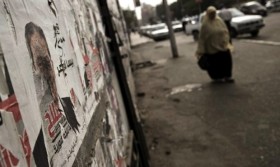 Howayda has a child with Down’s syndrome and lives in a slum in Cairo without public service. Yet, she refuses to accept anything but a normal, happy life for her daughter.
Howayda has a child with Down’s syndrome and lives in a slum in Cairo without public service. Yet, she refuses to accept anything but a normal, happy life for her daughter.
“That day, I thought my world has definitely come to an end, but little did I know… From the day when Shahd was born, happiness was my constant companion. Shahd has taught me more than what I’ve collectively learnt throughout 39 years. In fact, Shahd has benefitted me more than I did her.” This is how Howayda, a middle-aged Egyptian woman, felt about having a daughter with Down’s syndrome.
“When life gives you lemons, make lemonade.” Howayda is the perfect example of this saying. Her unrelenting will to make the most out of her life, her dedication to her role as a mother and her level of understanding and awareness despite her dire living conditions are living proof of the unrelenting human will.
On October 20, 2006 Howayda gave birth to a baby girl, who was instantly diagnosed with Down’s Syndrome. This piece of information turned the mother’s world upside down. From that moment on, Howayda had a mission – to work hard with Shahd so that she could have a blissfully normal life, just like any ordinary child. Although she came from a modest family, where she worked and provided for her family’s financial needs, Howayda quit her job when the repercussions of Shahd’s disabilities became evident.
Despite her upbringing in Ezbet El-Haggana, a slum area deprived of public services where parents are likely to be uneducated, Howayda had recognized and fully acknowledged the fact that her mum-job would entail a lot more than feeding Shahd and keeping her alive.
“I always asked around for advice on how to deal with Shahd, the kind of extra care she should be receiving and whether there were places which deal with children with disabilities,” said Howayda.
From public hospitals to NGOs, she had to go through hell and back to support her daughter. Thus, Howayda enrolled Shahd in speech and character development sessions for the disabled children in El-Demerdash public hospital and Resala Charity Foundation.
Resala is an Egyptian non-profit philanthropic organization, which was established in 1999 to provide aid to the poor and needy. With the indispensible participation of around 100,000 volunteers, Resala delivers a diverse set of services, which cater to a wide range of vulnerable groups including blind and deaf children, disabled people, elderly citizens, street children and orphans.
These vulnerable groups are aided in more modern ways than the traditional cash and food transfers; Resala is also focused on human development, through school remedial classes, training courses for university graduates and disabled education. The organization’s founder Sherif Abdelazeem had a vision about an Egypt where people help one another without return, and this was his way of turning a beautifully idealistic dream into reality. Resala is as much about the volunteers as it is about the poor and underprivileged. It is a place where the youth are empowered to act and spill over their energy in a constructive way.
Over the last decade, such bouts of benevolence have spurred youth-led civil society activities in Egypt. The newly established organizations have had a diverse set of “good causes”, from children development to environment protection and rural development.
A number of organizations such as Gneh Fel Yom (A Pound a Day), Dar El-Orman, Resala and Wayana (With Us), have devoted special focus on the area of disabilities, but not just in terms of the physical and mental well-being of the disabled. Wayana, for instance, aims at fostering an inclusive society where disabled people are treated as vital and productive, rather than marginalized and pitiful members of the society.
Yet, despite the countless efforts to raise awareness and campaign for the social rights of people with disabilities, cultural rejection of the disabled people still plagues the Egyptian society. In Howayda’s neighborhood, when she walks by with her daughter, young boys run after shouting over and over “Here comes the dumb girl!”
“Watching them calling her names like that, tears me apart,” says Howayda.
Yet, despite their cruel voices, Howayda strives to integrate her daughter with the rest of the society. She sends Shahd to an ordinary nursery so that she can receive pre-primary education and interact with normal kids.
“At first, I thought she was not learning something at the nursery though I knew she always had a blast there, running around and playing with her friends. Yet, one day, when her uncle was visiting us, she took a stick, and started pointing on the wall and teaching him the alphabets… I was honestly dumb-founded – I did not recognize that she could take in so much and understand what was being taught to her like normal children do.”
Despite the emotional drain Howayda must feel from being overburdened – caring for a disabled child, in addition to two healthy children and her sick mother, all while being constrained with her tight financial resources – she still finds the energy to give something back. While Shahd is attending her speech and character development classes, her mum keeps herself busy by volunteering to teach the Quran. She used to do it for a living before giving birth to Shahd, but now she does it for free.
In the midst of the overflow of chaotic outbreak of injustice, instability and the everyday nerve-wrecking news, it is crucial to hold on to and cherish every glimpse of hope your heart beholds. It is in that realm of pessimism that we need to remind ourselves that “even an ordinary secretary or housewife or a teenager can within their own small way turn on a small light in a dark room.”
